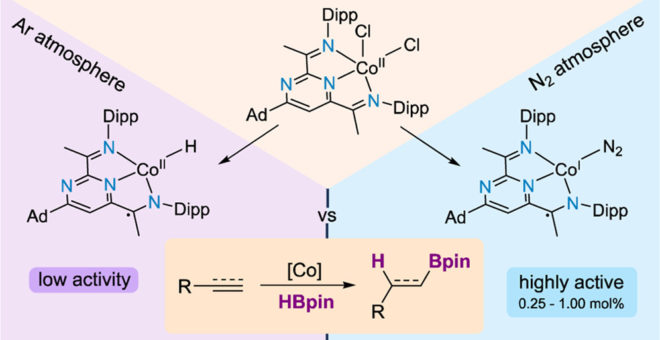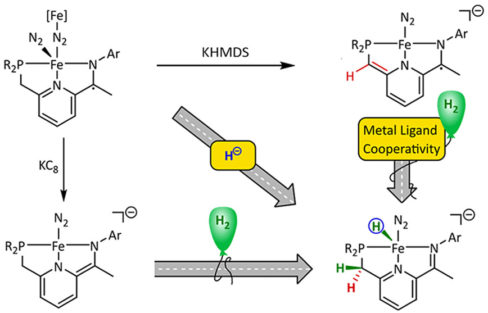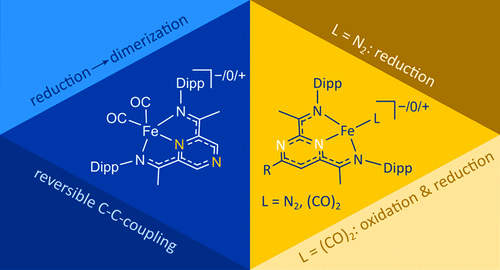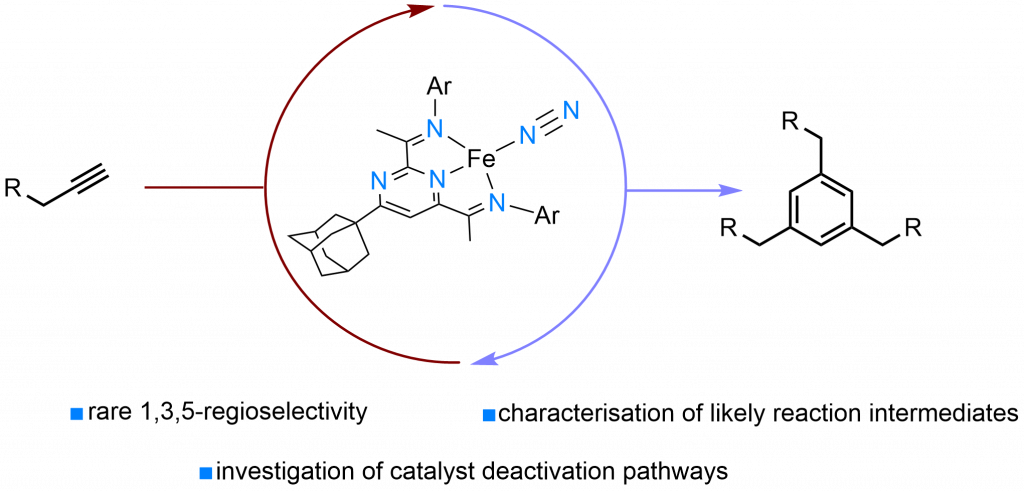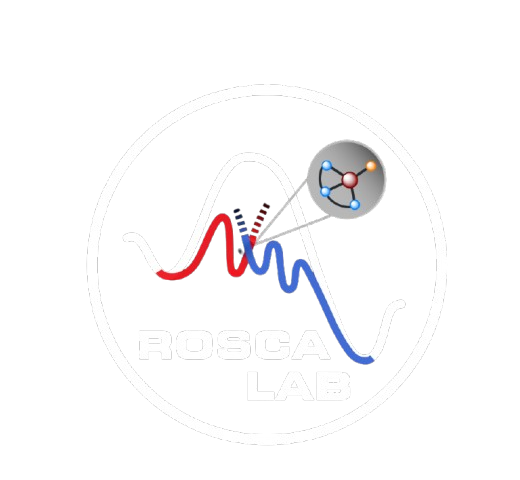
publications
Current work:
32. Synthesis of Cyclobutane-Containing Tricyclic β-Lactams Based on a Saturated Scaffold Enabled by Iron-catalysed [2+2]-Cycloaddition
Freitag, L.; Zeh, J.; Ziegenhagen, L. A.; Becker, F. J.; Roșca, D.-A.* Chem. Eur. J. 2025, e02476.
31. Highly active iron catalysts for olefin hydrogenation enable parahydrogen induced hyperpolarisation of 1H and 19F NMR resonances at 1.4 Tesla
30. Transition-metal catalyzed, thermally driven [2π+2π]-Cycloadditions of olefins and alkynes
Hertwig, L. E.*; Becker, F. J.; Roșca, D.-A.* Eur. J. Org. Chem. 2025, e202401403. (Invited contribution)
29. Diazines and Triazines as Building Blocks in Ligands for Metal-Mediated Catalytic Applications
28. The Atmosphere Matters: The Effect of ‘Inert’ Gas on the Catalytic Outcomes in Cobalt-Mediated Alkyne and Olefin Hydroboration
Doll, J.; Heldner, M.; Scherr, M.; Ballmann, J.; Roșca, D.-A.*, ACS Catal. 2023, 13, 8770–8782.
27. Iron-Catalyzed Synthesis of Conformationally Restricted N-Heterocycles via [2+2]-Cycloaddition: Exploring Ring Expansion, Mechanistic Insights and Challenges
Hertwig, L.; Bender, T.; Becker, F. J.; Jäger, P.; Demeshko, S.; Gross, S. J.; Ballmann, J.; Roşca, D.-A.* ACS Catal. 2023, 13, 6416–6429.
26. Terminal N2 Dissociation in [(PNN)Fe(N2)](µ-N2) Leads to Local Spin-State Changes and Augmented N2 Activation
25. Metal-Ligand Cooperativity in Iron Dinitrogen Complexes: Proton Coupled Electron Transfer Disproportionation and an Anionic Fe(0)N2 Hydride
24. Redox Activity of Iron Diazine-diimine carbonyl and dinitrogen complexes: a Comparative Study on the Influence of the Heterocyclic Ring
Doll, J. S.; Regenauer, N. I.; Bothe, V. P.; Wadepohl, H.; Roșca, D.-A.* Inorg. Chem. 2022, 61, 520.
23. Redox-Switchable Catalysis
Regenauer, N. I.; Doll, J. S.; Roșca, D.-A.* Encyclopedia of Inorganic and Bioinorganic Chemistry, 2022, doi: 10.1002/9781119951438.eibc2807 (Invited contribution)
22. Iron-Catalyzed Trimerization of Terminal Alkynes Enabled by Pyrimidinediimine Ligands: A Regioselective Method for the Synthesis of 1,3,5-Substituted Arenes
Doll, J. S.; Eichelmann, R.; Hertwig, L. E.; Bender, T.; Kohler, V. J.; Bill, E.; Wadepohl, H.; Roșca, D.-A.*ACS Catal. 2021, 11, 5593.
21. A Redox-active Heterobimetallic N-Heterocyclic Carbene Based on a Bis(imino)pyrazine Ligand Scaffold
Regenauer, N. I.; Jänner, S.; Wadepohl, H.; Roșca, D.-A.* Angew. Chem. Int. Ed. 2020, 59, 19320.
20. Trendbericht Anorganische Chemie: Nebengruppen, Koordinationschemie, Bioanorganik und mehr
Becker, S.; Roșca, D.-A. Nachrichten aus der Chemie 2021, 69, 66–80. (Not peer-reviewed)
19. Bis(imino)pyrazine-Supported Iron Complexes: Ligand-Based Redox Chemistry, Dearomatization, and Reversible C-C Bond Formation
Regenauer, N. I.; Settele, S.; Bill, E.; Wadepohl, H.; Roșca, D.-A.* Inorg. Chem. 2020, 59, 2604.
Before independent career:
18. Site-Selective trans-Hydrostannation of 1,3- and 1,n– Diynes: Application to the Total Synthesis of Typhonosides E and F, and a Fluorinated Cerebroside Analogues
Mo, X.; Letort, A.; Roşca, D.-A.; Higashida, K.; Fürstner, A.* Chem. Eur. J. 2018, 24, 9667–9674. (Hot paper)
17. Ruthenium-Catalyzed Alkyne trans-Hydrometalation: Mechanistic Insights and Preparative Implications
D.-A. Roşca, K. Radkowski, L. M. Wolf, M. Wagh, R. Goddard, W. Thiel, A. Fürstner* J. Am. Chem. Soc. 2017, 139, 2243.
16. Interligand Interactions Dictate the Regioselectivity of trans-Hydrometalations and Related Reactions Catalyzed by [Cp*RuCl]. Hydrogen Bonding to a Chloride Ligand as a Steering Principle in Catalysis
Rummelt, S. M.; Radkowski, K.; Roşca, D.-A.; Fürstner, A.* J. Am. Chem. Soc. 2015, 137, 5506 - 5519.
15, Interligand Interactions Dictate the Regioselectivity of trans-Hydrometalations and Related Reactions Catalyzed by [Cp*RuCl]. Hydrogen Bonding to a Chloride Ligand as a Steering Principle in Catalysis
Rummelt, S. M.; Radkowski, K.; Roşca, D.-A.; Fürstner, A.* J. Am. Chem. Soc. 2015, 137, 5506–5519.
14. Photochemical disproportionation of an Au(II) pincer complex: Synthesis and Structure of an Au(I)Au(III) Macrocycle
Roşca, D.-A.; Bochmann, M.* Organometallics 2016, 35, 27–31.
13. Gold(III)-CO and gold(III)-CO2 complexes and their role in the water-gas shift reaction
Roşca, D.-A.; Fernandez-Cestau, J.; Morris, J.; Wright, J. A.; Bochmann, M.* Sci. Adv. 2015, 1: e1500761. DOI: 10.1126/sciadv.1500761
12. Synthesis, C—N cleavage and photoluminescence of gold(III) isocyanide complexes
Roşca, D.-A.; Fernandez-Cestau, J.; Hughes, D. L.; Bochmann, M.* J. Organomet. Chem. 2015, 792, 117–122.
11. Reactivity of Gold Hydrides: O2 insertion into the Au—H bond
Roşca, D.-A.; Fernandez-Cestau, J.; Hughes, D. L.; Bochmann, M.* Organometallics 2015, 34, 2098–2101.
10. An element though the looking glass: Exploring the Au—C, Au—H and Au—O energy landscape
Roşca, D.-A.; Wright, J. A.; Bochmann, M.* Dalton Trans. 2015, 44, 20785–20807.
9. Gold peroxide complexes and the conversion of hydroperoxides into gold hydrides by successive oxygen-transfer reactions
Roşca, D.-A.; Wright, J. A.; Hughes, D. L.; Bochmann, M.* Nat. Commun. 2013, 4, 2167. DOI: 10.1038/ncomms3167
8. Electrochemistry of Au(II) and Au(III) pincer complexes: determination of the AuII—AuII bond energy
Dann, T.; Roşca, D.-A.; Wright, J. A.; Wildgoose, G. G.; Bochmann, M.* Chem. Commun. 2013 49, 10169–10171.
6. New Diorganoselenium(II) Compounds and Their Behaviour Towards Late Transition Metals
Pop, A.; Roşca, D.-A.; Mitrea, R.; Silvestru, A.* Inorg. Chim. Act. 2013, 405, 235–242.
5. A Thermally Stable Gold(III) Hydride: Synthesis, Reactivity, and Reductive Condensation as a Route to Gold (II) Complexes
Roșca, D.-A.; Smith, D. A.; Hughes, D. L.; Bochmann, M.* Angew. Chem. Int. Ed. 2012, 51, 10643–10646. (Very Important Paper)
Highlighted in:
Wolf, R.; Clever, G. “Trend Reports: Highlights in Inorganic Chemistry 2012” Nachrichten aus der Chemie 2013, 61, 235;
Hashmi, A. S. K. “Fire and Ice: A Gold(III) Monohydride” Angew. Chem. Int. Ed. 2012, 51, 12935.
4. Cyclometallated Gold(III) Hydroxides as Versatile Synthons for Au-N, Au-C Complexes and Luminescent Compounds
3. Selective Au−C Cleavage in (C∧N∧C)Au(III) Aryl and Alkyl Pincer Complexes
Smith, D. A.; Roşca, D.-A.; Bochmann, M.* Organometallics 2012, 31, 5998–6000.
2. Alkali aminoether-phenolate complexes: Synthesis, structural characterization and evidences for an activated monomer ROP mechanism
Roşca, S.-C.; Roşca, D.-A.; Dorcet, V.; Kozak, C. M.; Kerton, F.; Carpentier, J.-F.; Sarazin, Y.* Dalton Trans. 2013, 42, 9361–9375.
1. Bis(dimethylsilyl)amide Complexes of the Alkaline-Earth Metals Stabilized by β-Si-H Agostic Interactions: Synthesis, Characterization, and Catalytic Activity
Sarazin, Y.;* Roşca, D.-A.; Poirier, V.; Roisnel, T.; Silvestru, A.; Carpentier, J.-F.* Organometallics 2010, 29, 6569–6577.




